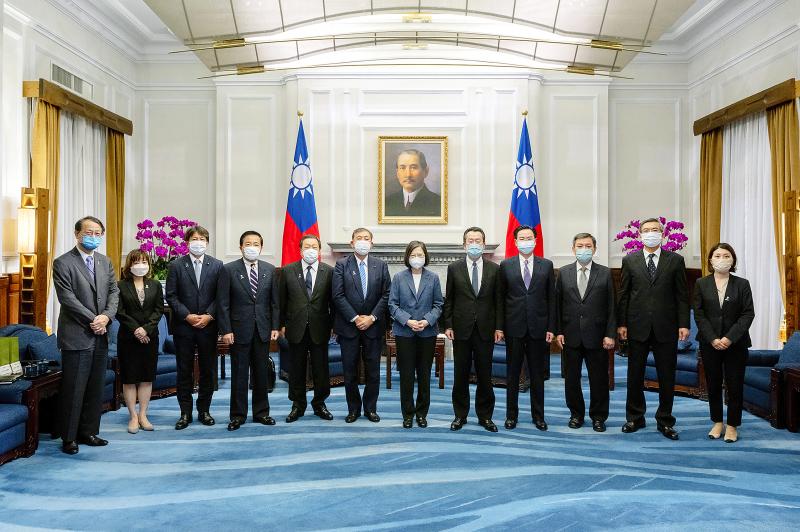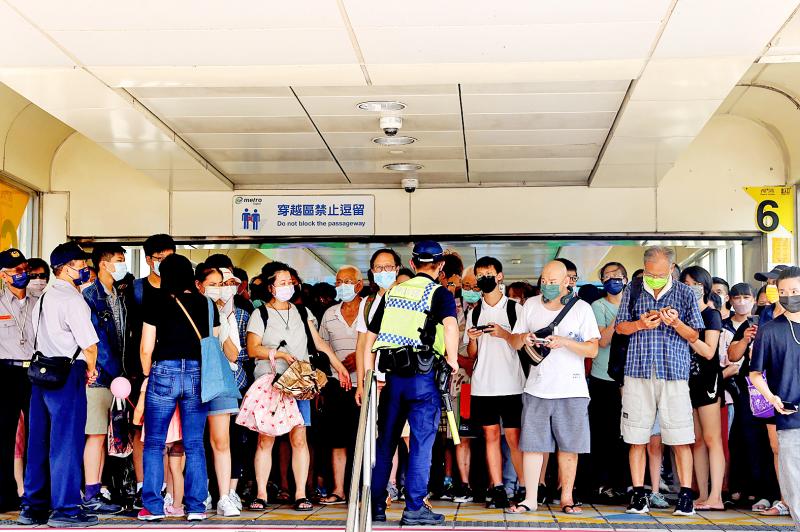The media is so wonderful. Something is happening with Taiwan, so readers must be treated to a rolling barrage of wrong assertions and bad history, born-in-Beijing justifications, Chinese propaganda delivered by Chinese officials, incorrect portrayals of US Taiwan policy and, of course, stern warnings that war is in the offing. All with nobody asking the Taiwanese for their opinion (of course!).
The media mess surrounding US House Speaker Nancy Pelosi kicked off with Edward Luce’s July 22 piece in the Financial Times, “Nancy Pelosi’s reckless jaunt to Taiwan.” The piece was based on an interview with Qin Gang (秦剛), the Chinese ambassador to the US. Luce agreed that Washington had forgotten that Taiwan was important to China: “Until recently this knowledge was deeply embedded in Washington’s foreign policy establishment.” Luce added: “I found it hard to dispute Qin’s view that America’s [“one China” policy] is being steadily eroded and ‘hollowed out’ in today’s Washington.”
Ah, the class solidarity of older gentlemen of means mooning about the lost and incomparably better past. The truth is that Luce simply passed along, with approval, Qin’s lies. The US’ “one China” policy does not recognize that Taiwan is part of China. Hence, US President Joe Biden was recently affirming it, not hollowing it out. Luce’s claim that Washington has forgotten that China badly wants to annex Taiwan is simply laughable, especially in light of this week’s storm over Pelosi.

Photo: AP
PROPAGANDA VICTORY
Luce handed the Chinese propagandist a rose to pace his loving gaze into Qin’s eyes: he described Taiwan’s pro-democracy forces as “separatist elements,” affirming China’s propaganda line (it should be noted that the UK position on Taiwan is identical to Washington’s).
He also said Taiwan has “historically been part of China,” a claim both historically false and morally absurd. Ireland is even closer to the UK and was part of an English state for far longer than half of Taiwan belonged to the Manchus. Does Luce seek its return to the English crown?

Photo: Reuters
One of the ways Westerners orientalize China is that we treat its imperialistic claims and faux history with deference and understanding: “Well, that’s China. 5,000 years, you know.” Yet the purpose of these lies, oft repeated in the Western media, is to legitimate China’s use of force against its neighboring states.
It is remarkable how normalized it has become for Chinese representatives to have unfettered and approving access to the Western media, while Western officials have no such freedom in the Chinese media. Media folks, it’s long past time to boycott Chinese officialdom until that changes.
Notable too is that Luce was sitting across from a wormtongue whose government would, if it could, destroy the UK and the global order it supports. It is easy to imagine Qin’s thoughts about the UK: “What is the House of Eorl but a thatched barn where brigands drink in the reek, and their brats roll on the floor among the dogs?”
Qin Gang, likely as he intended, helped drive a media firestorm. Downplaying and historically contextualizing rather than hyping China’s whining would give all sides more room for maneuver, but clickbait rules. Many observers said that the media hype could well make Beijing feel that it has to do something.
The Western media has repeatedly taught Beijing how it can manipulate the media to advance its goals. China has already done this successfully.
For example, in 2017 the US Congress inserted language in the 2018 National Defense Authorization Act, allowing “regular ports of call by the US Navy at Kaohsiung or any other suitable ports in Taiwan.”
A letter was sent to Congress from the Chinese ambassador and the media reported on a Chinese “diplomat” threatening war with the US should its ships dock in Taiwan. The media’s dutiful replication of these tropes helped Congress decide to remove the language. Score one for Beijing.
Never mind, as longtime Taiwan observer and military guru Mark Stokes then observed, that modest port calls would be consistent with the US’ “one China” policy and had already occurred (and would occur after that) despite clear threats from China. Never mind, as expert Dan Blumenthal noted too, China had routinely threatened war over arms sales and other issues for years, and nothing had happened.
The media needs to stop giving China’s noisemakers space. What Chinese “diplomats” say is not news, in the same way that Beyonce performing Halo once again is not news.
Against that background, it should be noted how intelligently the December 2016 phone call between President Tsai Ing-wen (蔡英文) and newly-elected US president Donald Trump was handled: quietly, quickly and presented to the world as a fait accompli, before China could draw its Western media pentacle and summon the media demons.
Several commentators stated that Chinese leader Xi Jinping (習近平) himself or China (a country with a vast intelligence apparatus and “united front” service, many of whose analysts were educated in the West) did not “understand” that in a democracy Biden can’t give Pelosi orders. This is simply the mirror orientalization of the old “inscrutable oriental” trope. Poor China, we Americans are so inscrutable.
Another crazed aspect of the overwrought media performance was that this firestorm exploded at the same time the US announced a decade of Chinese attempts to build an espionage network inside the US Federal Reserve System, including multiple detentions of a US citizen on a trip to Shanghai in 2019. Remarkably, not a single media report linked these two items in any way.
CONTEXTUALIZING BEIJING’S WHINING
Remarkable too, was the fact that Pelosi’s trip was announced in April. Why the storm now? Because the Chinese wanted it that way. Visiting Taiwan at the same time as this mess was a bipartisan delegation of lawmakers and former officials from Japan. The Chinese said little about that trip, hugely important though it is, because a storm in the Japanese press will remain there, thanks to the language barriers.
It goes without saying that few press pieces queried the Taiwanese for their opinions (a notable exception was a sturdy piece in the Guardian by Helen Davidson). That too is a pro-China move by the media — Beijing has pretended for years that Taiwanese do not exist and the issue is a problem between China and the US.
Longtime scholar and observer Wen-ti Sung (宋文笛), a fellow at the National Taiwan University Office of International Affairs, contextualized China’s language in a nifty thread on Twitter.
“Many observers take ‘forceful response’ to mean war. That may be overselling it,” he observed. The “operative words youli (有力) can mean ‘forceful’ or ‘effective’. If they meant war, they would have said wuli (武力, military) or feiheping (非和平, non-peaceful measures).” Summarizing, he stated: “In short, China’s current language is tough but far from its toughest.”
Journalists need to take this to heart: the Chinese use tension to manage Washington and manage the media. Stop helping them. Instead, bring in Taiwan. Sung’s analysis above, simple and clear, was a thousand times better than anything that appeared in the major Western newspapers.
Highlight the repetitive and empty nature of China’s noises. Every utterance needs to be given the context that Chinese noises at the media are boilerplate with a long history of repetition. Shape pieces with real history, not Chinese propaganda. Stop sourcing quotes from people who receive large sums from Chinese sources (looking at you, New York Times) or businessmen with interests in China like Henry Kissinger.
As of this writing Pelosi has invited other members of Congress on the trip. In fact, if accomplished, the trip will look a lot like the Japanese delegation.
The one nobody noticed.
Notes from Central Taiwan is a column written by long-term resident Michael Turton, who provides incisive commentary informed by three decades of living in and writing about his adoptive country. The views expressed here are his own.

We lay transfixed under our blankets as the silhouettes of manta rays temporarily eclipsed the moon above us, and flickers of shadow at our feet revealed smaller fish darting in and out of the shelter of the sunken ship. Unwilling to close our eyes against this magnificent spectacle, we continued to watch, oohing and aahing, until the darkness and the exhaustion of the day’s events finally caught up with us and we fell into a deep slumber. Falling asleep under 1.5 million gallons of seawater in relative comfort was undoubtedly the highlight of the weekend, but the rest of the tour

Youngdoung Tenzin is living history of modern Tibet. The Chinese government on Dec. 22 last year sanctioned him along with 19 other Canadians who were associated with the Canada Tibet Committee and the Uighur Rights Advocacy Project. A former political chair of the Canadian Tibetan Association of Ontario and community outreach manager for the Canada Tibet Committee, he is now a lecturer and researcher in Environmental Chemistry at the University of Toronto. “I was born into a nomadic Tibetan family in Tibet,” he says. “I came to India in 1999, when I was 11. I even met [His Holiness] the 14th the Dalai

Following the rollercoaster ride of 2025, next year is already shaping up to be dramatic. The ongoing constitutional crises and the nine-in-one local elections are already dominating the landscape. The constitutional crises are the ones to lose sleep over. Though much business is still being conducted, crucial items such as next year’s budget, civil servant pensions and the proposed eight-year NT$1.25 trillion (approx US$40 billion) special defense budget are still being contested. There are, however, two glimmers of hope. One is that the legally contested move by five of the eight grand justices on the Constitutional Court’s ad hoc move

Stepping off the busy through-road at Yongan Market Station, lights flashing, horns honking, I turn down a small side street and into the warm embrace of my favorite hole-in-the-wall gem, the Hoi An Banh Mi shop (越南會安麵包), red flags and yellow lanterns waving outside. “Little sister, we were wondering where you’ve been, we haven’t seen you in ages!” the owners call out with a smile. It’s been seven days. The restaurant is run by Huang Jin-chuan (黃錦泉), who is married to a local, and her little sister Eva, who helps out on weekends, having also moved to New Taipei